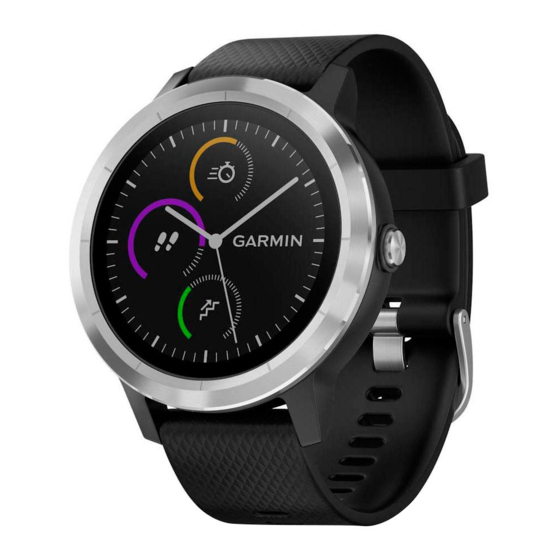- ページ 6
見る Garmin VIVOACTIVE 3のPDF トラブルシューティングマニュアルをオンラインで閲覧またはダウンロードできます。Garmin VIVOACTIVE 3 7 ページ。
Garmin VIVOACTIVE 3 にも: オーナーズマニュアル (28 ページ), トラブルシューティングマニュアル (5 ページ), よくある質問 (9 ページ), オーナーズマニュアル (28 ページ)

When you plan to workout, warm up a bit before starting the activity. In addition to this, make
sure you are properly wearing the watch. Tips on fit are described in the next section.
Accuracy of Wrist Heart Rate When Swimming
Swimming with wrist heart rate enabled on compatible products can be challenging. The large
arm motions can affect the level of blood volume in the wrist area, chilly water can reduce the
amount of blood in the tissue on the back of the wrist, and the water can "pull" on the watch
creating a gap between the optical heart rate sensor and the skin. The same tips apply to swim as
other types of activities. Warm-up a bit before starting the swimming activity and make sure you
are properly wearing the watch. Specifically:
The optical heart rate sensor must remain in contact with your skin at all times
The watch must be worn snug, but not too tight
o
Too loose and the watch can slide around, creating a gap between the sensor and your
skin.
o
Too tight can restrict blood flow
The watch is properly snug when you can move the watch and the skin underneath moves with
it.
Skin Tone May Affect Heart Rate Accuracy
Skin tone can have an effect as the melanin in the skin absorbs some of the light. While Garmin
designs our watches to work on all skin tones, the sensor may have to work harder to find a pulse
that can require slightly more battery power.
